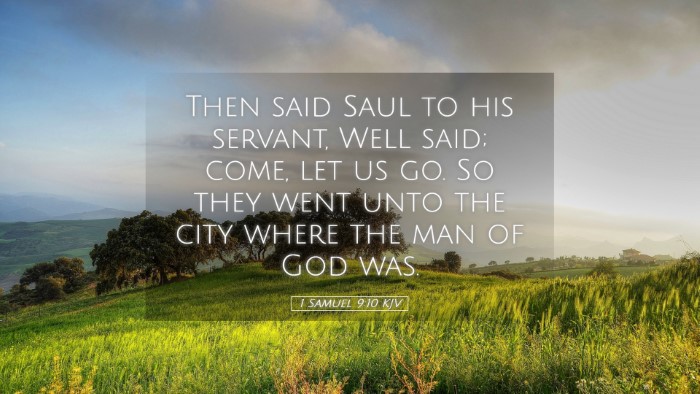Commentary on 1 Samuel 9:10
1 Samuel 9:10 states, "Then said Saul to his servant, Well said; come, let us go. So they went unto the city where the man of God was." This verse serves as a pivotal moment in Saul's journey from an ordinary man to becoming the first king of Israel. Below is a synthesis of insights from esteemed public domain commentators, including Matthew Henry, Albert Barnes, and Adam Clarke.
Contextual Overview
To fully appreciate the implications of this verse, we must consider the broader context of Israel's history and the significance of the prophetic role. The Israelites demanded a king to lead them, and God directed Samuel to anoint Saul. This moment marks a crucial point in divine sovereignty and human agency.
Divine Appointment
Matthew Henry emphasizes that even in seemingly ordinary circumstances, God's providence orchestrates events to fulfill His purposes. Saul's quest to find his father's lost asses leads him to Samuel, showcasing how mundane activities can become the means through which divine destiny unfolds.
The Role of the Servant
Albert Barnes notes the significance of the servant in this narrative. The servant's suggestion to seek the prophet reveals his wisdom and the importance of companionship in decision-making. This dynamic illustrates the role of others in guiding one towards divine encounters.
The Importance of Prophetic Guidance
The journey to find the seer (Samuel) underlines a broader theological theme: the necessity of prophetic guidance in discerning God's will. Adam Clarke points out that during a time when the Word of God was rare, seeking out the prophet was a significant act of faith. Prophets served as intermediaries, providing direction and insight.
- The Nature of Inquiries: Saul's inquiry to seek out the man of God is profound. It demonstrates humility and a recognition of the need for divine insight.
- Response to Divine Initiative: Saul's willing response to the servant indicates an openness to God's leading. This is crucial for anyone seeking to follow God's call in their lives.
Theological Implications
This verse raises several theological themes worthy of reflection:
- God's Sovereignty: The trajectory of Saul's life demonstrates that God's plans often utilize the circumstances that we view as trivial or disrupting.
- Human Responsibility: While God orchestrates events, human participation remains essential. Saul's decision to heed his servant's advice reflects human active agency in divine plans.
- Seeking God: This narrative emphasizes the importance of recognizing our need for divine guidance. In a world filled with distractions, the act of seeking God becomes a defining hallmark of faith.
Practical Applications
For pastors, students, theologians, and Bible scholars, this verse invites reflection on several practical applications:
- Encourage Active Seeking: Believers should be encouraged to actively seek God's will through prayer, scripture, and wise counsel from others, much like Saul did.
- Foster Community: The importance of companionship and trusted relationships should not be underestimated in our spiritual journey. Discipleship and mutual encouragement are essential.
- Embrace the Ordinary: God can work through our everyday situations to reveal His plans. We must learn to see the sacred in the mundane.
Conclusion
Ultimately, 1 Samuel 9:10 serves as a reminder of God's sovereignty and the necessity of seeking His guidance. In the narrative of Saul and his servant, we see a microcosm of the believer's journey: the pursuit of divine wisdom and the unfolding of God's plans. As we continue to study and reflect on this text, may we be inspired to deepen our relationship with God and respond to His leading in our lives.


